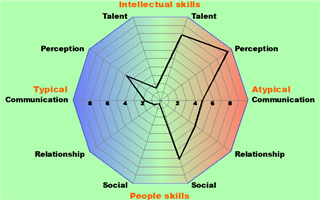Recently Kefka posted his results of what I know as "The Aspie quiz" and Uhane requested a link to it, so I have copied the link below (hope it works)
https://embrace-autism.com/aspie-quiz/
This test results in a 10 sided chart, showing how strong your atypical (autistic) and typical (neurotypical) traits are, which I find really interesting. For an example, here is my result:
This matches my my attention to detail, pattern recognition and special interests (high atypical talent) and my need for predictability and my hypersensitivity (high atypical perception). I have what is maybe an unusual communication score for someone on the spectrum, however this is an ability to interpret and display typical non verbal communication - not as I originally thought, being ok at conversation. (Verbal communication is in the talent section of the typical side of the graph)
I have a question about this test - does anyone know if it is used anywhere for formal diagnosis?


